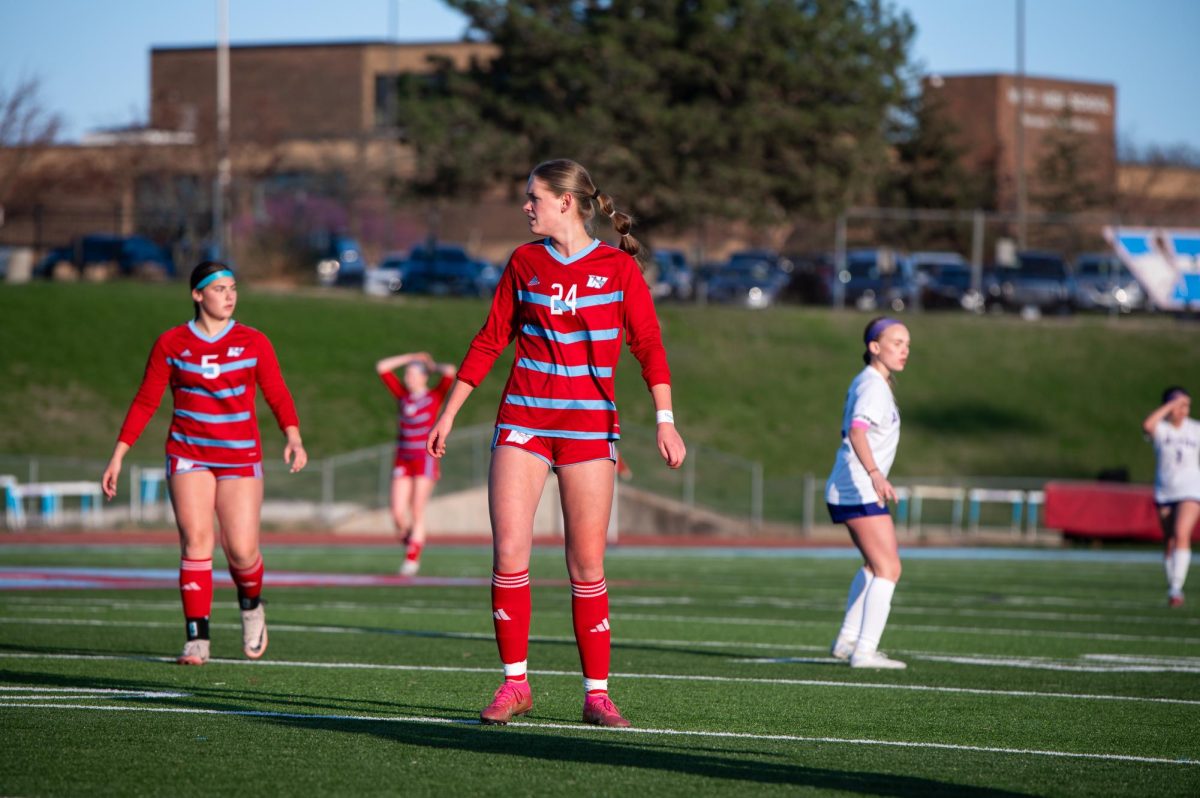After being told to go back to China or receiving racist messages online, Asian American athletes excelled in the international Winter Olympics Games. Americans celebrated two highly talented Olympians who brought home gold medals after the Olympics ended Feb. 20 in Beijing, China. Korean American snowboarder Chloe Kim and Chinese American figure skater Nathan Chen brought home gold medals after representing the United States (U.S.) in their respective events. Many students spoke on how influential watching Asian American Olympians thrive during the Games was.
Chen and other Asian athletes have talked about the importance of Asian portrayal and representation in sports. In addition, their outreach towards the Asian American community has influenced young Asian Americans, such as sophomore Lia Emry who was adopted at a young age from China.
“Growing up, I got a lot of Asian hate. My eyes are a big target since they are hooded, and they don’t look like everybody else’s. [So] to see people who look like me represented on TV and within sports [felt] good,” Emry said. “Chloe Kim is a really good snowboarder, and I’m inspired to someday learn how to snowboard like her. These people who worked so hard their whole lives and put everything into this sport finally get to [show] it off at the Olympics.”
Around 50 different Asian ethnicities speak over 100 different languages within Asia, yet in the past, ethnic diversity was rarely showcased in the Olympics. Sophomore Kayden Senseney celebrated his Japanese heritage by cheering on Japanese snowboarder Ayumu Hirano, who won gold in the men’s snowboard halfpipe representing Japan.
“As an Asian American, representation is important to me because it helps me relate to certain topics [and] feel welcomed in [different] settings. The Olympics [showed] a diverse group of people coming together to compete against each other in various ways,” Senseney said. “Even if they play the same sport, their strategies and skills can be completely different. [For example], I enjoyed watching Ayumu Hirano win gold on the men’s halfpipe.”
With the increase in Asian athletes within the U.S. Olympic teams, there have been accusations conveying that Asian American ice skaters are not deserving of their spot on the U.S. team solely because of their ethnicity. This offended sophomore Serena Liu, especially after watching Chen win gold in figure skating during the men’s singles event, Feb. 10.
“I don’t think Asians are overrepresented in sports. The best American athletes in a specific sport should represent America, [and] their [ethnic] background shouldn’t matter. [For example], everyone on the [U.S.] figure skating team was American, representing America,” Liu said. “My favorite competitor on the U.S. team was Nathen Chen because his performance was so graceful and impressive.”
Through posts on Instagram, Kim raised awareness on how hurtful receiving anti-Asian comments felt by opening up about hate she has received after becoming a dominant Asian woman in sports. Sophomore Angie Ren is inspired by Kim and strongly supports ending Asian American hate within our community and on social media. The Stop Asian American Pacific Islander (AAPI) Hate movement has brought together the Asian community during the pandemic to combat racism against Asian American and Pacific Islander communities.
“I’ve been called racial slurs, and people have been normalizing it as a joke. I’ll be talking with friends, and they will call me racial slurs, and I don’t think that is okay at all. I’ve gotten so used to it that it doesn’t bother me anymore. It’s very wrong for me not to feel disturbed by it because it shows how normalized it has become,” Ren said. “More representation [in sports] would show how beautiful Asia’s culture is and would help [get rid] of negative stereotypes about Asians.”
The Asian Based Celebration (ABC) Club, co-founded by Liu, plans to eliminate harmful racial stereotypes by representing the Asian community. Through presentations, group discussions and celebrations of famous Asian icons like Kim and Chen, the ABC Club hopes to make Asian students feel welcomed into all school sports and clubs.
“[I started the ABC Club] because I thought we needed a space to celebrate Asian culture, especially after the pandemic and rise in anti-Asian hate crimes. Asian representation is important for students because as a minority, standing in solidarity with each other can help people feel more comfortable and involved in sports,” Liu said. “It’s important that teens see people like them reflected in important venues [like the Olympics] because representation inspires teens to pursue careers or passions.”
The U.S. won eight gold medals during the Games, two of which were won by Asian Americans.
“[Asian representation] is important to me because seeing people who look like me or have a similar background inspires me. Growing up on Disney Channel, I didn’t see a lot of Asians besides the nerdy stereotype. [So] it’s nice to see the media showing that Asians [are] not a single stereotype,” Liu said. “It’s inspiring for my little sister to see Asian athletes compete at the Olympics because it makes us feel proud. It lets her know that she can accomplish so much more beyond the stereotypical.”



![Smiling in a sea of Longhorns, Fox 2 reporter Ty Hawkins joins junior Darren Young during the morning Oct. 3 pep rally. The last time West was featured in this segment was 2011. “[I hope people see this and think] if you come to [Parkway] West, you will have the time of your life because there are so many fun activities to do that make it feel like you belong here. I was surprised so many people attended, but it was a lot of fun,” Young said.](https://pwestpathfinder.com/wp-content/uploads/2025/10/Edited2-1200x798.jpg)
![West High seniors and families listen as a representative of The Scholarship Foundation of St. Louis, Teresa Steinkamp, leads a Free Application for Federal Student Aid (FAFSA) workshop. This session, held in the library, provided guidance on financial aid, scholarships and student loan options. “This event is very beneficial for any seniors who are applying to or considering applying to colleges after high school [because] the cost of college is on the rise for seniors and parents,” college and career counselor Chris Lorenz said.](https://pwestpathfinder.com/wp-content/uploads/2025/09/DSC_4478-1200x778.jpg)
![Senior Kamori Berry walks across the field during halftime at the Homecoming football game on Sept. 12. During the pep assembly earlier that day, she was pronounced Homecoming Queen. “I thought it was nice that the crowd [started] cheering right away. I know [my friends] were really excited for me, and my family was happy because typically non-white people don't win,” Berry said.](https://pwestpathfinder.com/wp-content/uploads/2025/09/DSC7046-Enhanced-NR-1200x798.jpg)



![Pitching the ball on Apr. 14, senior Henry Wild and his team play against Belleville East. Wild was named scholar athlete of the year by St. Louis Post-Dispatch after maintaining a high cumulative GPA and staying involved with athletics for all of high school. “It’s an amazing honor. I feel very blessed to have the opportunity to represent my school [and] what [it] stands for,” Wild said.](https://pwestpathfinder.com/wp-content/uploads/2025/05/unnamed-6-1200x714.jpg)
![The Glory of Missouri award recipients stand with their certificates after finding out which virtue they were chosen to represent. When discovering their virtues, some recipients were met with contented confirmation, while others, complete surprise. “I was not at all surprised to get Truth. I discussed that with some of the other people who were getting the awards as well, and that came up as something I might get. Being in journalism, [Fellowship of Christian Athletes and] Speech and Debate, there's a culture of really caring about truth as a principle that I've tried to contribute to as well. I was very glad; [Truth] was a great one to get,” senior Will Gonsior said.](https://pwestpathfinder.com/wp-content/uploads/2025/04/Group-Glory-of-Missouri.jpg)

![After a thrilling point, senior Katie Byergo and junior Elle Lanferseick high-five each other on Oct. 8. With teamwork and camaraderie, Byergo worked together in the game against Lafayette High School. “[Byergo’s] is really positive with a good spirit,” Lanferseick said. “I set her [the ball] and she hits it [or] gets the kill.”](https://pwestpathfinder.com/wp-content/uploads/2025/10/DSC_9349-1-e1761159125735-1200x791.jpg)
![Focused on providing exceptional service, sophomore Darsh Mahapatra carefully cleans the door of a customer’s car. Mahapatra has always believed his customers deserve nothing less than the best. “[If] they’re trusting us with their car and our service, then I am convinced that they deserve our 100 percent effort and beyond,” Mahapatra said.](https://pwestpathfinder.com/wp-content/uploads/2025/10/DSC_0018-1200x800.jpg)
![Sophomore Aleix Pi de Cabanyes Navarro (left) finishes up a soccer game while junior Ava Muench (right) warms up for cross country practice. The two came to Parkway West High School as exchange students for the 2025-2026 school year. “The goal for the [exchange] program is to provide opportunities for both Parkway students and our international exchange students to learn about other cultures, build connections and become confident, capable, curious and caring — Parkway’s Four C’s — in the process,” Exchange Program Lead Lauren Farrelly said.](https://pwestpathfinder.com/wp-content/uploads/2025/10/Feature-Photo-1200x800.png)
![Leaning on the podium, superintendent Melissa Schneider speaks to Parkway journalism students during a press conference. Schneider joined Parkway in July after working in the Thompson School District in Colorado. “My plan [to bond with students] is to get things on my calendar as much as possible. For example, being in [classes] is very special to me. I am trying to be opportunistic [meeting] kids [and] being in [the school] buildings. I have all the sports schedules and the fine arts schedules on my calendar, so that when I'm available, I can get to them,” Schneider said.](https://pwestpathfinder.com/wp-content/uploads/2025/09/IMG_5425-1200x943.jpeg)
![Gazing across the stage, sophomore Alexis Monteleone performs in the school theater. The Monteleone family’s band “Monte and the Machine” has been releasing music since 2012, but Alexis started her own solo career in 2024 with the release of her first single, Crying Skies. “My whole family is very musical, [and I especially] love writing [songs with them],” Monteleone said.](https://pwestpathfinder.com/wp-content/uploads/2025/09/DSC7463-1200x798.jpg)
![Leaping through the air, senior Tyler Watts celebrates his first goal of the season, which put the Longhorns up 1-0 against the Lafayette Lancers. Watts decided to play soccer for West for his last year of high school and secured a spot on the varsity roster. “[Playing soccer for West] is something I had always dreamed of, but hadn’t really had a good opportunity to do until now. It’s [really] fun being out [on the field], and I’m glad I decided to join the team. It’s just all about having fun with the boys and enjoying what time we have left together,” Watts said.](https://pwestpathfinder.com/wp-content/uploads/2025/09/DSC_1951-1200x855.jpg)

![Shifting global trade, President Donald Trump’s tariffs are raising concerns about economic stability for the U.S. and other countries alike. “[The tariffs are] going to pose a distinct challenge to the U.S. economy and a challenge to the global economy on the whole because it's going to greatly upset who trades with who and where resources and products are going to come from,” social studies teacher Melvin Trotier said.](https://pwestpathfinder.com/wp-content/uploads/2025/05/MDB_3456-1200x800.jpg)
![Red, white and blue, the American flag holds the values of our democracy. The fight that we once endured has returned, as student journalists and senior correspondents across the country are losing their voices due to government control. “[Are] the White House and [the] government limiting free speech [and] freedom of the press? Yes [they are],” chief communications officer of the Parkway School District and former journalist Elisa Tomich said.](https://pwestpathfinder.com/wp-content/uploads/2025/03/Untitled-design-14.jpg)
![Freezing in their position, the Addams Family cast hits the “rigor mortis” pose after cast member and senior Jack Mullen, in character as Gomez Addams, calls out the stiff death move. For the past four months, the combined company of cast members, orchestra pit, crew and directors all worked to create the familial chemistry of the show. “I’m excited for [the audience] to see the numbers, the music, the scenes, but I also just love all the technical aspects of it. The whole spectacle, the costumes, makeup and the people that put in the work backstage in order to make the show successful on stage. I’m excited for people to see and appreciate that,” Mullen said.](https://pwestpathfinder.com/wp-content/uploads/2025/03/DSC0116-1200x800.jpg)



![Blue lights shining brightly, senior Riley Creely beatboxes into the microphone. Creely and the group began the performance in front of the blue lights, sparking interest from the audience. “The pep rally performance was fun. I got to beatbox for the first half of the song, which was hype. I liked to look into the student section [while I performed],” Creely said.](https://pwestpathfinder.com/wp-content/uploads/2025/09/DSC_5085-Enhanced-NR-1200x799.jpg)

![Hugging senior Ella Wheeler, senior Jamaya Love beams after scoring a touchdown at the Powderpuff football game on Sept. 11, putting the seniors on the scoreboard with a score of 6-2 above the juniors. The seniors went on to capture the victory with a final score of 12-2. “I was actually gassed [at this moment]. I was so tired. But, everyone on the sideline, all my teammates and everybody in the stands were cheering,” Love said.](https://pwestpathfinder.com/wp-content/uploads/2025/09/DSC1735-Enhanced-NR-2-1200x799.jpg)
![Raising her hands in the air, freshman Jillian Sternhagen follows Mr. Mooney’s lead during an activity Aug. 15 at freshman orientation. Surrounded by other freshmen, Sternhagen learned an “A O E day” chant to help remember their new weekly high school schedule. Students participated in several activities to get to know each other, the school and the upperclassmen. “We got to tour the school and learn where everything in our schedule is. The energy [at orientation] was fun; the leaders were peppy and got us excited,” Sternhagen said.](https://pwestpathfinder.com/wp-content/uploads/2025/08/DSC_0145-1200x798.jpg)

![“I started playing [basketball] because I saw that my brothers were playing, and I found it fun; I started playing at age eight and have continued to play ever since. [Something] I enjoy [is] the back-and-forth competitiveness of basketball that I don't get when I play softball, as well as our team bonding activities because I think it helps with the chemistry throughout our group and in the real world. I also enjoy winning and all of the competitive aspects. [Basketball] has brought great memories and people into my life, and I enjoy spending most of my time with them and cherish the memories my team has created. Getting to go out and play with my very best friends every day is just the best gift a girl can get. A big thing that motivates me is how much time and effort my coaches put in. I just want to work hard because they work hard, while also making my parents proud at the same time. Sometimes, it’s not an easy task being able to balance school and athletics, but with the right mindset and focusing on the goals that I have set for myself, it’s achievable. In high-pressure situations, I just go back to playing my own game [and the basics within the game] rather than focusing on everything around me because I trust my training and my practice. [My advice for upcoming players] is to keep going and continue to practice. Nobody is perfect, there is always going to be something to improve or get better at. There is always going to be someone out there who is doing better than you, and if you want to be the best, you have to keep going and push yourself to be better, but most importantly just have fun in what you’re doing.” - Siena Snyder, 12](https://pwestpathfinder.com/wp-content/uploads/2025/03/DSC0571-Enhanced-NR-Ella-McNeal-1-1-1200x798.jpg)
![“[I think being a teacher comes] from a place of experience, where we all enjoyed high school. It had a meaningful impact on us, which was [the case] for me. I had a lot of good mentors in high school, and seeing the opportunity, the impact that they could make, I think [that was] what inspired me. [It] definitely goes back to one teacher in particular [that] I had in eighth grade, he was a huge role model for me, and somebody who I was so appreciative of what he did for me. I figured if I could do even a fraction of what he did I feel like I would be very fulfilled [in] myself, and so there's just that aspect of wanting to do something meaningful every day.” - Kaleb Schumer, English](https://pwestpathfinder.com/wp-content/uploads/2024/12/IMG_9428-1200x800.jpeg)

Serena • Mar 17, 2022 at 7:40 pm
omg that’s me also super well-written story Emma!